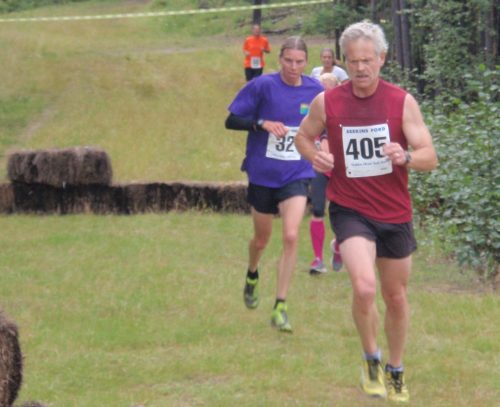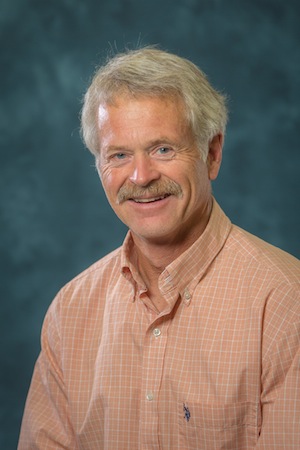A COVID-19 story from a rugged Alaskan
May 21, 2020
Ned Rozell
907-474-7468

After the final steps of a long run in early March, Greg Finstad took his pulse rate. His heart was at 38 beats per minute. Perfect. The reindeer biologist and marathon runner was in top shape to run this year’s Boston Marathon.
From there, things did not follow the plan for Finstad, head of the Reindeer Research Program at –‘”˚…Á. After reaching his peak of fitness, not long after he was alone in his bedroom, gasping for what he thought might be his last breath.
Finstad was infected with the COVID-19 virus. It knocked him down and almost took him out.
Finstad is not a typical 65-year-old: The sturdy researcher has wrestled reindeer with the Alaska Natives of the Seward Peninsula and St. Lawrence Island for more than a quarter century. He was shooting for a 3-hour, 30-minute performance this year at the Boston Marathon.
“I considered myself a tough guy — I can tough it out; that virus isn’t tougher than me,” he said recently in a phone interview. “Well, it is tougher than me.”
Finstad, who is now home in Fairbanks recovering with achy joints but the ability to ride his bike with his granddaughters, was one of the first confirmed cases of the disease in Fairbanks.
His story of the damage wrought by a particle one-thousandth the width of an eyelash began in late February 2020.
Back then, Finstad was on St. Lawrence Island doing reindeer work. One day, he received a text from his wife, Bev. His father, 91 and living in Vancouver, Washington, had passed away.
Finstad caught a flight to Nome, then flew to Seattle, on to Portland and drove to Vancouver. He made it in time to attend his dad’s memorial service.
While in Washington state, then emerging as a hotspot for the virus that causes COVID-19, Finstad helped his mother get settled in an assisted-living facility. To relieve some stress and keep on with his training program, he mapped out a route and ran for 18 miles one day.
Finstad then flew to Buffalo, New York, via Seattle and Chicago. He is on the board of directors for the Reindeer Owners and Breeders Association, and spoke at the organization’s annual meeting there.
From Buffalo, he traveled back to Alaska on March 8, 2020. He remembers extreme congestion within the corridors of Seattle-Tacoma International Airport.
“It was spring break when I was coming back,” he said. At Sea-Tac, “there were rivers of people in every terminal. If anyone sneezed, that virus could have infected a dozen people.”
Back in Alaska, Finstad briefly visited his office in a –‘”˚…Á building that was almost empty during spring break. He felt fine, but his visit soon after led to that building being one of the first structures on campus closed to visitors.
Home from his journey to bury his father, move his mother to an unfamiliar place and give the keynote speech at a conference, Finstad and his family drove down to their cabin in the Alaska Range. His three granddaughters were off from school for their own spring break. Time at the cabin with them is a family tradition.
There in the one-room structure, Finstad began to feel fatigued.
“I got aches all over, and then my senses of taste and smell disappeared,” he said. “This was not like the flu. My body’s response to this was very different.”
By chance, he had a medical thermometer at the cabin. He took his temperature and found he had a fever. He tried to stay as far away from his family as he could. They decided he needed to return home.
In Fairbanks, doctors dressed in protective gear met him at Tanana Valley Clinic. First, they gave him a flu test.
“It was the first time I ever hoped I had the flu,” he said.
The next day, a doctor from the clinic called to tell him he tested positive for COVID-19.
“My stomach just fell,” he said.
Soon, he had more than just mental anguish.
Isolated in his bedroom later that night, he could feel the virus reach his lungs. He went from breathing normally to struggling to suck in a single breath.
“It felt like an elephant was sitting on my chest,” he said.
He also likened the feeling to having a plastic bag duct-taped around his neck.
“It’s like mile 22 of a marathon — you’re hurting, taking one step at a time. For me, it was one breath at a time.”
At the lowest moment of his experience, his wife Bev came up and started crying when she saw him through the glass door of the bedroom.
“I started crying, too: I thought, ‘Man, this is it.’”
But the end was not to be. Mornings came. Finstad breathed a little easier, but nights were when the “monster reared its head.”
Finally, after 13 days of isolation in his bedroom, the details of which he hardly remembers, Finstad breathed easier and felt a bit better. To his biologist mind, his immune system had battled like hell, and barely won.
He credits the workers at the Alaska Department of Health and Social Services for calling him right away, interrogating him as to whom he had been with and where he had been, and checking in with him several times each day. They gave him advice and told him several times they didn’t know an answer to some of his questions, which he also appreciated.

Now, he has gradually recovered. He is trying to run again, maybe to toe the line in the postponed Boston Marathon in September or, more likely, his favorite Equinox Marathon that same month in Fairbanks. But he knows he is not the same as he was in early February.
“I don’t know if my lung capacity will ever come back,” he said. “But you know what? I don’t care. I appreciate every breath I take now. Life is good.”
Along with his newfound appreciation of living (which to this observer always seemed to be high), he wants to be a living cautionary tale as to the danger of the virus that causes COVID-19.
“We’ve thrown all the world’s resources at this, and it’s still killing people left and right. That’s what impresses me and scares me.
“Having recovered from this, there’s a certain amount of immunity,” he said of himself. “I still wear a mask and my hands are raw (from washing them).
“I want to tell people who take their mask off (in tight spaces): You know, I’ll bet I was tougher than you, and it just about killed me.”
Since the late 1970s, –‘”˚…Á' Geophysical Institute has provided this column free in cooperation with the –‘”˚…Á research community. Ned Rozell is a science writer for the Geophysical Institute.


